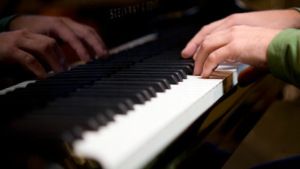Things to do
Concert Review: Sounds of bitter joy
This article is more than 7 years old.
★★★★☆☆

Too quick at times (photo: dkdm.dk)
On the windy evening of Thursday 26 April, the renowned Norwegian pianist Jens Harald Bratlie visited the Danish Academy of Music.
Bratlie gave a short but satisfying concert that focused on music by Johannes Brahms and Edvard Grieg.
Master and his art
The guest artist is considered to be one of Norway’s leading pianists. Born in 1948, Bratlie has collaborated with various orchestras around the world and has toured extensively, from London and Moscow to Los Angeles and beyond.
He has also made a number of excellent recordings. For example, be sure to check out his interpretation of Grieg’s piano concerto.
And on Thursday, Bratlie found his way to Copenhagen and the audience at the Studiescenen welcomed him warmly.
The romantic attitude
The program included only four compositions. The highlights were Grieg’s Ballade and Brahms’ Intermezzo nr 2 op 117 as well as variations on a theme of Paganini op 35.
From the very first bars of music, the listeners experienced a rather unique atmosphere. The music was expressive of joy but with a looming sense of melancholy. This was especially clear in Brahms’ pieces, which are known for being expressive of strong and not always entirely positive emotions.
However, the evening was certainly not all doom and gloom. In Grieg’s ballade and his variations on Norwegian folk melodies, a careful and imaginative study of melody and form was heard. At times swift and soft melodies filled the room with irresistible grace.
No need to hurry
Although Bratlie’s skill cannot be denied, his interpretation of Brahms felt slightly rushed. Dynamically, no-one could take anything away from his playing. But, the phrasing was at times somewhat strange.
Arguably, certain passages of the intermezzo nr 2 could have been played more slowly. This would allow the emotional effect of the music to be more pronounced.
Short and sweet
The concert was short but enjoyable. Keep your eyes open for more guest concerts at the Danish Academy of Music.
Many of the concerts, which tend to take place several times a month, are free.
Now that there is so much more light and life in the city, there really is no good reason not to check out some of the concerts out there.










































